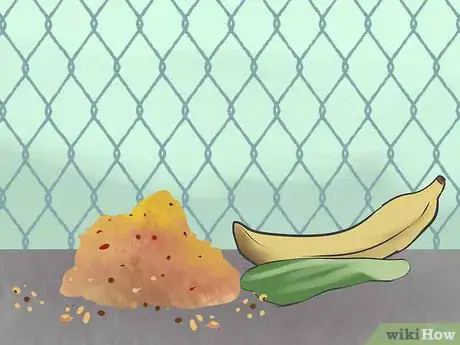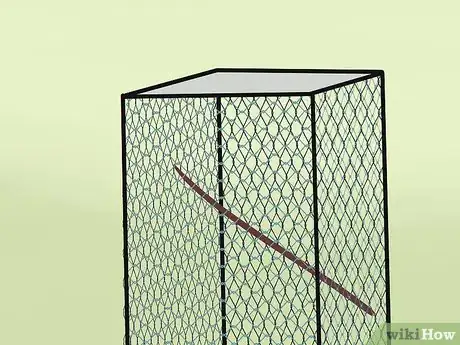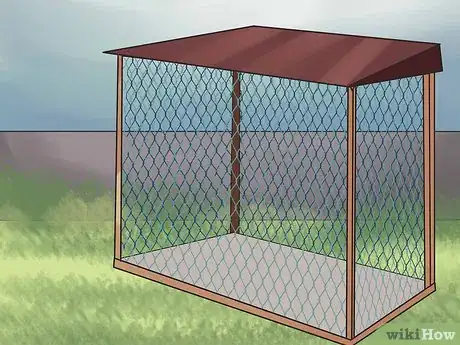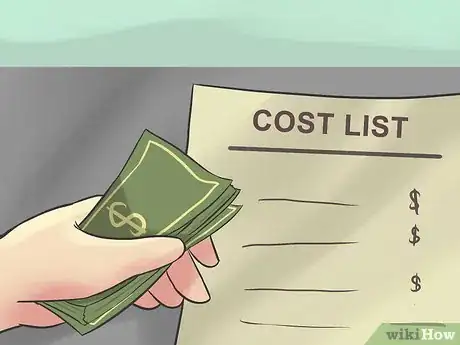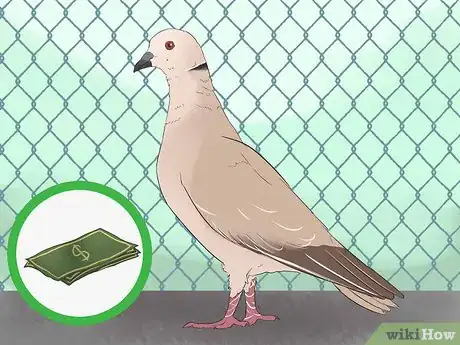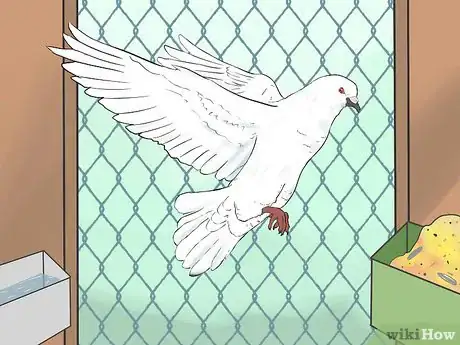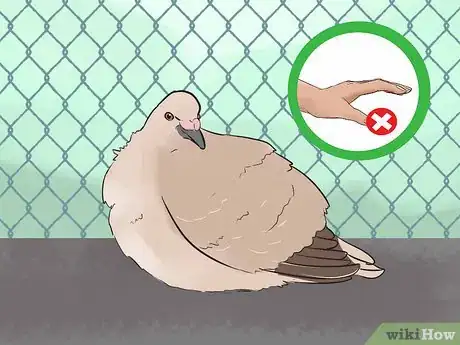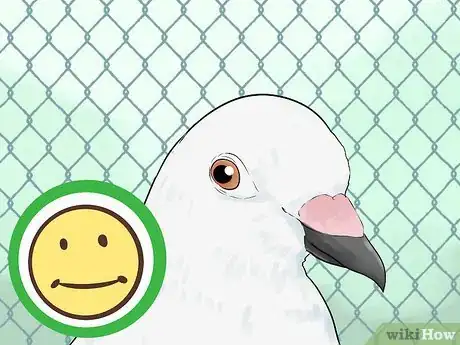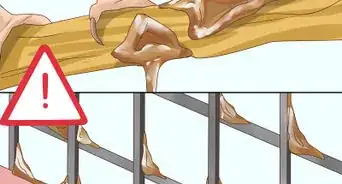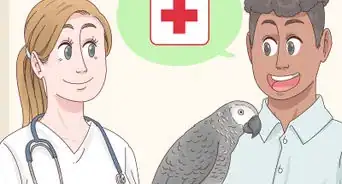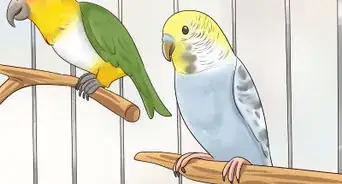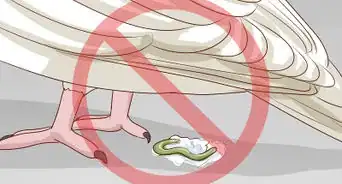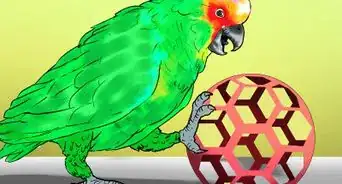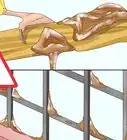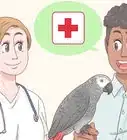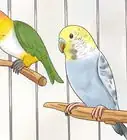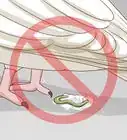This article was co-authored by Ryan Corrigan, LVT, VTS-EVN. Ryan Corrigan is a Licensed Veterinary Technician in California. She received her Bachelor of Science in Veterinary Technology from Purdue University in 2010. She is also a Member of the Academy of Equine Veterinary Nursing Technicians since 2011.
This article has been viewed 19,201 times.
Doves are common birds that are gentle and known for their cooing sounds. If you are considering having one as a pet, you should consider the time they require, the cost of their upkeep, and whether they will fulfill your desires in a pet. With some care and consideration you can decide whether a dove is the right pet for you.
Steps
Determining Care Requirements
-
1Familiarize yourself with the requirements for a proper diet. In order to determine if a dove is right for you, you should know what it needs to eat. Doves tend to eat a mixture of seeds and fresh fruits and vegetables. Seeds should make up about 60 to 70 percent of the bird's diet, with a variety of fruits and vegetables making up the rest.[1]
- There are some fruits and vegetables that a dove shouldn't eat, including avocados and fruit seeds.
- Doves also need access to grit in order to properly digest the seeds that they eat.
-
2Figure out how to create a proper habitat for a dove. Doves need a lot of room to flutter around, so their cages should be larger than the cages for most other pet birds. They are typically kept in flight cages, which should be 24" wide, 24" deep, and 24" tall at minimum.[2]
- You should try to find the biggest cage you can afford for your doves. This will let them fly and exercise as much as possible.
- Doves will also need a variety of perches and toys to keep occupied. Be sure to give them perches of different diameters, too, to exercise their feet.[3]
- Doves need a lot of space because they need to be able to fly up to perches and food dishes instead of climbing up to them the way other birds, such as parrots, can.
Advertisement -
3Find a place to keep your dove's cage. Since a dove's cage needs to be relatively sizable, it can be hard to find a place indoors to keep it. If you really want to keep doves but you have a small home, you may need to put its cage outdoors.[4]
- Keeping a cage outdoors will require that the cage is protected from weather and extreme temperatures. Try to keep your cage off the ground and away from things like drafts, as well.
-
4Determine if you can pay for start up costs. In order to determine if a dove is right for you, figure out how much money you can spend on it. In general, you should to spend at least $300 for all the equipment and the bird. However, it may cost more depending on the quality of the supplies that you buy. Make a realistic budget for yourself and determine whether you have expendable income that can be used for start up costs.[5]
- Start up costs include the cost of the bird, the cage, food and water dishes, food, perches, and other supplies.
-
5Calculate long-term costs. In addition to the initial cost, caring for doves requires that you buy supplies for the life of the bird – as long as 10 to 25 years, depending on the variety and the care they get. The most obvious long-term cost is the bird's food but there can be other costs, such as cleaning supplies.[6]
- Long-term costs can also include the cost of veterinary care. This may or may not be required but should be taken into consideration.[7]
Considering Your Compatibility
-
1Commit to spending time caring for your doves every day. Doves require care every day. The daily care they require includes covering their cage at night and uncovering it in the morning, giving them fresh fruits and vegetables, cleaning and replacing the seeds in seed dishes, and cleaning and replacing the bird's water. Additionally, it is a good idea to spend a bit of time each day around the cage so you can bond with the bird.[8]
- There are also weekly chores that you will have to complete in order to take care of a dove properly. The most time consuming of these is cleaning your bird's cage from top to bottom.
- If you think you have the time to do all this, then a dove might be right for you.
-
2Don't expect a cuddly pet. Doves are not cuddly pets that enjoy handling. They should be handled infrequently, as handling can cause the bird great distress. However, they do benefit from interaction. You should let a doves out of their cages regularly or keep them in pairs so that they get stimulation from one another.[9]
- If you try to have too much direct contact with a dove it can cause the bird to injure itself when it flies away from you in its cage.
- While doves don’t offer much direct contact, they still make good pets. Many people especially enjoy the soft cooing that doves make.
-
3Expect a calm and gentle pet that is easy to care for. A dove can be a wonderful pet that is easy to care for. While you will need to give it daily care, this does not take up very much time. If you want a great beginner pet, you may want to try a dove.[10]
- In comparison to other birds, such as parrots, the amount of time needed to care for a dove is minimal.
References
- ↑ https://www.petco.com/content/petco/PetcoStore/en_US/pet-services/resource-center/caresheets/dove.html
- ↑ https://lafeber.com/pet-birds/species/dove/
- ↑ https://www.petco.com/content/petco/PetcoStore/en_US/pet-services/resource-center/caresheets/dove.html
- ↑ http://www.pigeonrescue.org/birds/pigeons-doves-as-pets/pigeons-as-pets-indoors-or-outside/
- ↑ http://www.peteducation.com/article.cfm?c=15+1794&aid=1516
- ↑ http://www.peteducation.com/article.cfm?c=15+1794&aid=1516
- ↑ http://www.peteducation.com/article.cfm?c=15+1794&aid=1516
- ↑ https://lafeber.com/pet-birds/species/dove/
- ↑ http://www.rescuereport.org/2011/12/ringneck-doves-as-pets-guest-post-by.html
About This Article
To determine if doves are right for you, consider if you can provide the kind of diet they need, which is primarily seeds, fresh vegetables, and fruit. You’ll also need to be able to provide a large flight cage that will offer them plenty of room to fly, exercise, play, and roost. Look for a sheltered area outside your home where you can put the cage, since it will probably be too large to keep indoors. Before buying doves or any housing and equipment, look at your budget to determine what you can afford. You’ll likely need to spend at least $300 just to get started. Since some doves can live up to 25 years, it’s also important to consider the long-term costs, including food and vet bills. Read on for more advice from our Veterinarian co-author, including how to determine if doves are a good fit for your personality.
